#it happens during russia attack on ukraine
Explore tagged Tumblr posts
Text

5. A gift from the past.
Up until the moment the officer gazes at the holo of the infant boy, it’s easy to believe Loi’e may have been mistaken in her identification of the eyepatch-wearing Imperial. But as he removes his cap to show the scars where two horns once protruded from his skull, we know her intuition has served her well. And instead of just another nameless Imperial soldier, a cog in the Empire’s galactic machine, we begin to see him as Loi’e did. A little boy who was stolen, a child who was indoctrinated, and a young man who can still change his mind.
#star wars#the spy dancer#star wars visions#i will admit the spy dancer hit harder than I thought it could#i did not expect the story to be about stolen child#an literal alien forced to fit into human imperial society#by cutting his horns and hiding those “flaws” and mother to see him anyway as her own#this hits harder because stuff like that happened in our real world#stealing children and raising them as your future loyal - INDOCTRINATED - generation of empire's supporters?#it happens during russia attack on ukraine#it happened during IIWW with nazi germans stealing Polish children and giving to german families for adoption if they could pass as aryan#and i'm just talking about east europe in the less than 100 years while kidnapping and/or indoctrination children happened#under different empires in different times and places#which makes the spy dancer hits hard about empire treatment of people#star wars visions really are amazing how the show is using traumas & folklore & human experiences to tell an universal story
26 notes
·
View notes
Note
Do you mind me asking how the electricity situation is? I understand it's probably awful to put it lightly. But Russia is targeting electrical infrastructure now
Hi. I can only talk about my area, which is in central Ukraine, the situation is different for each region. We have schedules for hourly blackouts. Sounds scary, but it's just so people can be prepared to be without electricity for two or more hours and know when it happens, then another two hours with power, and so on. Each address has a queue number corresponding to a particular blackout schedule, so it’s not only different between regions but even within one city.
After the most recent mass attack, some people in my town were without power for many hours, while others, like my lucky self, experienced only "regular" blackouts. Now we typically have 2-4 hours without power - sometimes less, sometimes more. Other queues have it worse than we do, it depends. We've been lucky lately. On weekends, we almost don’t have blackouts. Overall, it’s been much better than this summer when we sometimes had just 1–2 hours with electricity a day, nonconsecutive. It was hell. For the past two days, it’s been completely normal for us. Almost no outages!
Again, this is my small town in the center of Ukraine. People closer to the frontlines have it much, much worse. If a city is within the range of Russian artillery, they target infrastructure day and night, deliberately attacking and killing workers who arrive to fix it.
In the rest of Ukraine, people have adapted to the blackouts. Those with money and private houses have diesel generators and/or solar panels. People in flats, like us, rely on charging stations, power banks, etc. Most of the stores have generators. We have two large charging stations: one for our heater/boiler (which can run for about a day or more) and one for our laptops and fiber-optic internet, which works even during power outages. One day, when we had no power for a long time, we went outside and smelled gas - turns out our downstairs neighbor put a generator right below his flat’s window. (that’s gotta be illegal, though, lol)
Of course, all these measures are expensive, and not everyone can afford them. But the situation could've been way worse.
Sorry if this reply is too long.
#i guess i'll post it in case anyone else is wondering#it's really different every day#i'm surprised we've made it through a month of winter as well as we did#ask#ukraine
163 notes
·
View notes
Text
On Top of the totally fictional story of black immigrants eating their neighbors cats and dogs here are some more totally fictional stories Trump made up in the last month, does he believe these are real things that happened? or does he just not care at all if he lies making things up at will?
1 Harris and the military draft
At a rally in Las Vegas last week, Trump claimed his Democratic opponent, Vice President Kamala Harris, is talking about forcing Americans to serve in the military: “She’s already talking about bringing back the draft. She wants to bring back the draft, and draft your child, and put them in a war that should never have happened.” That’s absolute bunk. Harris is not talking at all about bringing back the draft.
2 Harris’ CNN interview
Trump claimed during a Fox News event in Pennsylvania in early September that Harris “had notes” to assist her during the television interview she did with CNN in late August. He even performed an impression in which he portrayed Harris supposedly looking down at these notes. She didn’t actually have any notes.
3 Transgender children and schools
At an event held by a conservative group in late August, Trump claimed that schools are sending children for gender-affirming surgeries without their parents’ knowledge. He said, “The transgender thing is incredible. Think of it. Your kid goes to school and comes home a few days later with an operation. The school decides what’s going to happen with your child.” Trump’s campaign subsequently made clear to CNN that it could not find a single example of such a thing having happened anywhere in the United States. Parental consent is required for gender-affirming operations; schools have not performed or approved these surgeries for minors behind their parents’ backs. Even after Trump’s campaign demonstrated that it couldn’t substantiate the story, he repeated it days later at a Wisconsin rally in early September.
4 Harris and the Russian invasion of Ukraine
Trump told a vivid story on Fox News in late August about how President Joe Biden supposedly sent Harris to negotiate with Russian President Vladimir Putin in 2022 in an effort to prevent an invasion of Ukraine. Trump claimed Harris was sent “to see Putin in Russia three days before the attack. She went. She said – she gave her case. He attacked three days later. He attacked three days later. He laughed at her. He thought she was a joke.” Trump also told a version of the story at the September debate. But this story, too, is wholly false. Biden never sent Harris to negotiate with Putin – in fact, the Kremlin said in July that Harris and Putin have never spoken – and Harris did not travel to Russia just prior to the invasion. Rather, Harris traveled to a conference in Germany to meet with US allies, including Ukrainian President Volodymr Zelensky.
5 Harris’ identity
Trump claimed at a convention of Black journalists in late July that Harris used to “only” promote her Indian heritage, then “all of a sudden” made a “turn” and “became a Black person.” Defending the claim, Trump reiterated at the September debate that Harris had “put out” at some point that “she was not Black.” None of that is true. Harris – who was raised in a Black community and graduated from a historically Black university – has embraced her Black identity since her youth. While she has also fondly discussed her South Asian heritage, she never “put out” that she wasn’t Black.
6 Harris’ 2020 primary performance
Trump has repeatedly claimed during the last month that Harris was so unpopular when she previously ran for the presidency, in 2019, that she was the very first candidate to drop out of the crowded Democratic primary. “She was one of 22 people that ran. She was the first one to quit,” he said at a Pennsylvania rally in late August. Not even close. In fact, 13 other Democratic candidates dropped out of the race before Harris did – including the sitting or former governors of Washington, Montana and Colorado; the sitting mayor of New York City; and sitting or former members of the House of Representatives and Senate.
7 Opinions of Roe v. Wade
Facing heavy criticism from Harris and others for appointing three of the Supreme Court justices who overturned the Roe v. Wade abortion rights decision in 2022, Trump concocted a tale that this unpopular decision fulfilled the wishes of “everybody” – including “every Democrat.” “Every Democrat, every Republican, everybody wanted Roe v. Wade terminated and brought back to the states,” Trump said on Fox News in late August. This is not even remotely accurate. Roe was consistently supported by a majority of the American public, and it was overwhelmingly popular among Democrats – with 80% support or better among Democrats in many polls.
8 Elections in California
At a September press conference in California, Trump claimed that “if I ran with an honest vote counter in California I would win California, but the votes are not counted honestly.” He had delivered an even more colorful version of the claim in an interview in late August, saying, “If Jesus came down and was the vote counter, I would win California, okay?” More rubbish. The votes are counted honestly in California, as they are in every other state; Trump loses California because it is an overwhelmingly Democratic state that has not chosen a Republican presidential candidate since 1988. He lost the state in 2020, fair and square, by more five million votes and more than 29 percentage points.
9 A ‘Man of the Year’ award in Michigan
Since 2016, Trump has told a lie that he was named “Man of the Year” in Michigan before he entered politics. Media outlets including CNN have repeatedly noted that Trump never got such an award and that the award doesn’t even appear to exist. But Trump claimed at a Michigan event on Tuesday that he has now been vindicated. “The press said, ‘Oh, it never happened.’ Well, then it did happen. They found out where it was,” Trump said. “But it was like 15 years ago, a beautiful area, but nobody remembered it; nobody remembered it all. All of a sudden, like through a miracle, they found out it did exist.” That’s a lie on top of a lie. The media has not discovered proof that Trump got a Michigan Man of the Year award. His campaign didn’t respond Wednesday to a request to explain what he was talking about.
10 Migrants, prisons and ‘the Congo’
For months, Trump has told a story about how “the Congo” has deliberately emptied prisons to somehow get its criminals to come to the United States as migrants. “Many prisoners let go from the Congo in Africa, rough prisoners,” he said at an August event in Arizona. At an August rally in Pennsylvania the week after, he said, “In the Congo, in Africa: 22 people deposited into our country. ‘Where do you come from?’ ‘The Congo.’ ‘Where in the Congo?’ ‘Jail.’” But Trump has presented zero evidence that “the Congo” has actually emptied any prisons for migration purposes. Representatives for the governments of both the Democratic Republic of Congo and the neighboring Republic of Congo have told CNN on the record that the claim is fiction, experts on the two countries say they have seen no evidence it is true, and Trump’s campaign has ignored requests to offer any substantiation.
11 The jobs revision
After the federal Bureau of Labor Statistics announced in August that its annual revision of jobs data found that the economy added about 818,000 fewer jobs than initially reported for the 12 months ending in March, Trump told a story about how the government had been planning to announce this downward revision “after November 5th,” Election Day, but was forced to do so before the election because of “a whistleblower” – “a patriot leaker.” Another fabrication. The Bureau of Labor Statistics regularly releases the preliminary revised data in August, and it had disclosed the precise date of this particular data release – August 21 – weeks in advance. William Beach, a conservative economist who was appointed by Trump to lead the Bureau of Labor Statistics, wrote on social media: “For those who think the big revision to the BLS jobs numbers ‘leaked’ and was meant to come out after the election, remember that BLS always announces its draft revisions in August and announced this year’s date, August 21, many months ago. It is important to check your facts.”
211 notes
·
View notes
Text
My two years today
Two years ago I was in Ukraine with my family. We will never gather at the same table as before. I have no opportunity to come home, my grandmother died, several acquaintances are missing, my cat also died without veterinary care. The city is empty, my younger sister goes to school under occupation, where she is forced to draw thank you cards for russian soldiers and the teachers mock her for her Ukrainian accent. She constantly cries and asks me to pick her up, but I don’t know what to say. My mother had a stroke, but she was not admitted to the hospital during the occupation because she did not have a Russian passport, and they did not manage to help her in time. Parts of her brain are permanently disabled, and she barely recognizes me or moves. I'm glad she's alive, but I no longer have support in my mother, this happened too soon.
Abroad, I was once attacked by russian emigrants in Lithuania. They saw my passport when I was buying tickets, and then they followed me and started pushing me and calling me a Nazi. A taxi driver helped me and took me away from there. The last time I was in Ukraine, a rocket fell near the house where I was visiting. Neither I nor anyone in the house was surprised or frightened, it was just the deep despair of millions of people from hopelessness.
I don’t remember well half a year during the occupation, but I remember how we made a fire to cook food, that there was no water, buses with loudspeakers drove through the streets, calling for surrender. How they came and took our medicines from our houses. How we went to rallies and had grenades thrown at us. I saw two huge piles rising above the ground - with the remains of cars and, apparently, with the remains of bodies and everything else. This picture is very unclear, I almost threw up, and after a couple of minutes a russian military man came up to me and asked if I loved russia. I answered "yes". What else could I say?
Now I am undergoing treatment from a psychiatrist and am trying to work to donate to those in need. Every day there are only more and more and more of them... those who have lost their home, limbs or loved ones. It pains me to see requests for help with funerals.
I feel nothing today except emptiness
376 notes
·
View notes
Text
two years have already passed...
today, two years ago, all of Ukraine woke up to explosions, sounds of flying fighter jets, gunshots and screams of terror. today, February 24, is the anniversary of russia's invasion of Ukraine. full-scale invasion, escalation of ten-year genocide. I can't explain the feeling when I first saw wounded people, when I first heard a rocket flying overhead aimed at a residential building.
it is emotionally difficult to comprehend all the terrible events that happened during this time. everything I'm trying to cover here as soon as I get my thoughts together. and everything that I don't have enough strength for...
Bucha massacre
Mass burials in Izium
Mass execution of Ukrainian prisoners in Olenivka
The tragedy of Mariupol
Defense of Azovstal
Bakhmut Fortress
Ecological disaster in Kakhovka
The tragedy of Hroza
Tens of thousands of Ukrainian children forcibly deported to russia
Torture of civilians
The battle for Donetsk Airport
The Ilovaisk Tragedy
russian manipulation and propaganda
burning Ukrainian books, destroying Ukrainian museums and entire cities, torturing people for tattoos connected to Ukraine. forced re-education of children and adults who are forced to learn the russian national anthem, worship portraits of putin every day and receive russian documents in order to receive water and food in the occupied territories. daily shelling and casualties, daily struggle for survival and freedom, which russians want to take away from us.
all the terrible cases of execution of Ukrainian soldiers: beheadings, castration, amputation of limbs, execution of prisoners. burning civilians alive, raping women, men and children, torturing even animals, even little mice. tons of photos and videos that I don't want to add here because even the slightest glimpse of all those images breaks my heart and causes me to have a panic attack. however, you can find it all freely available on the Internet by simply typing in keywords.
instead, I would like to show photos of rallies in support of Ukraine, which took place today all over the world. to find out where each photo is from, see the alt text for them.

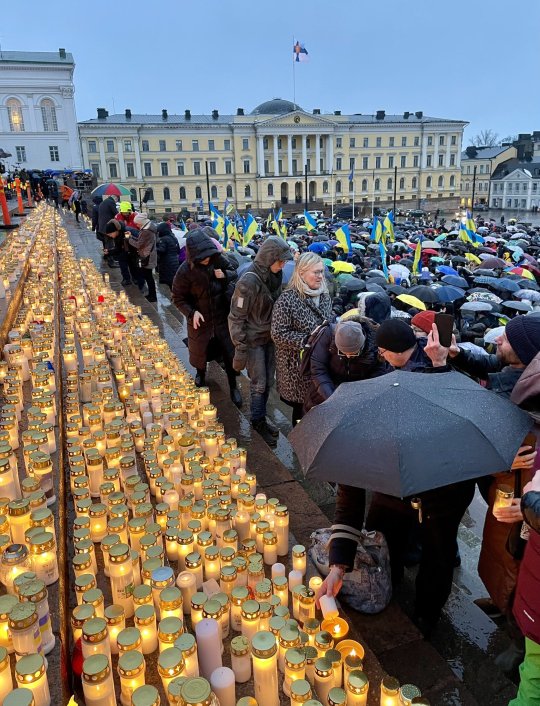
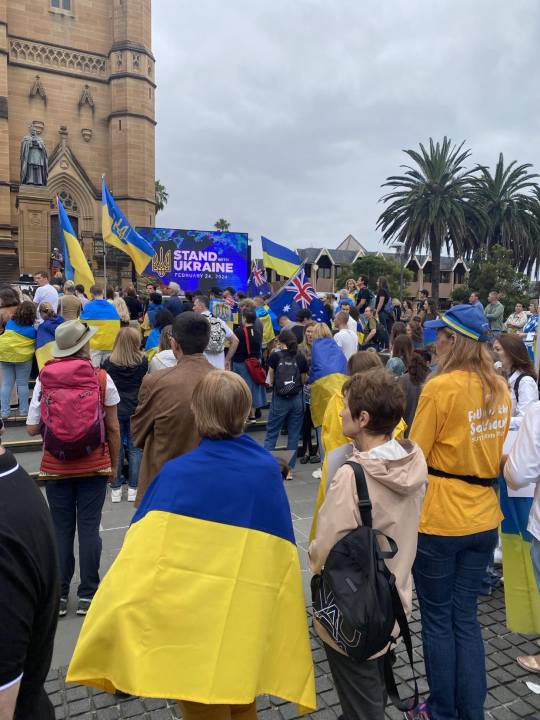

despite the fact that in russia they celebrate the war, Ukrainians, who were forced to flee from the war, gathered at rallies around the world, together with residents of the countries that gave them shelter. the civilized world expresses sympathy and grief, with calls to provide arms to Ukraine so that we can defeat russia as soon as possible and return peace to our lives.
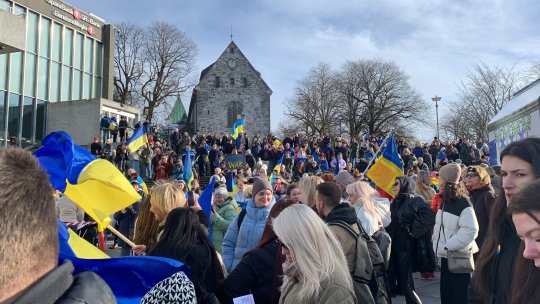
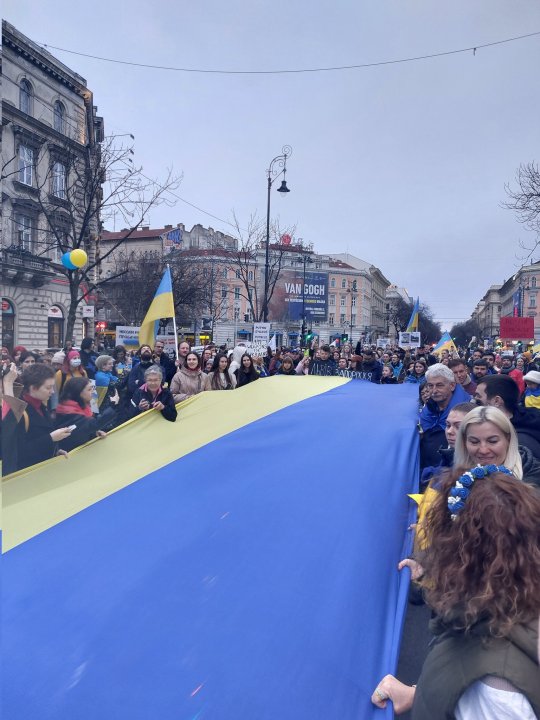

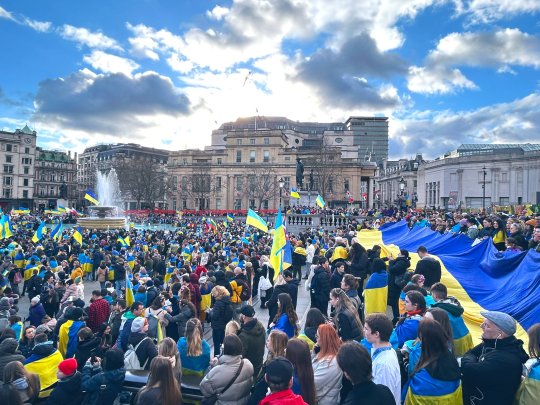
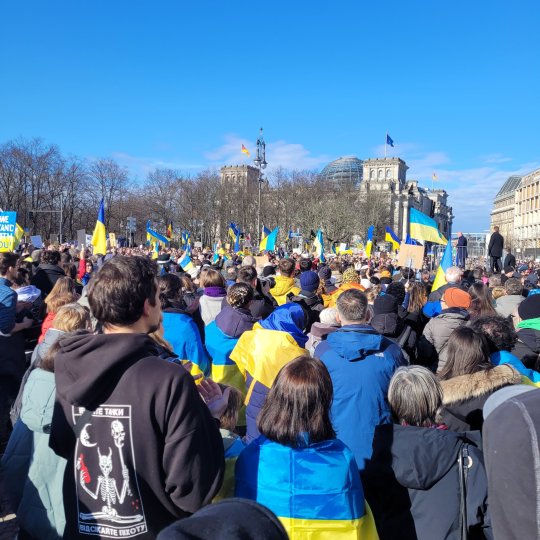

it's sad that more photos can't be added to show as many cities as possible that came out to support us today. but I've been looking at all the photos and videos of the rallies all day today and I have tears of gratitude in my eyes. thank you all for continuing to stand with Ukraine!
#stand with ukraine#russia is a terrorist state#help ukraine#support ukraine#save ukraine#stop russia#fuck russia#russian agression#russian invasion#russian culture#russian art#russia#russian terrorism#ukraine#signal boost#rally#russian war crimes#war in ukraine#war
345 notes
·
View notes
Text
What concerned me in Xiran Jay Zhao's post and their notes is that they say there's "no worthy reason to hit the printing house". Because there is one, but westerners actively avoid discussing it: russia just wants to eradicate us and our culture.
russia has been burning all Ukrainian books on the occupied territories but everyone ignored it. And this attack (that happened almost a week ago, actually) was also part of this. Faktor Druk was one of the biggest printing houses in Europe and Ukraine will probably face a shortage of books, especially textbooks. It was also done close to the beginning of Book Arsenal (Книжковий арсенал), which is the biggest literature festival in Ukraine and was attended by Zelensky last year. This year the festival is focused on war literature, especially war diaries, and a lot of them were in print at Faktor Druk during the strike.
For russia Ukrainian civilian objects are a legitimate target because they want us gone. This is genocide.
But of course organizations like the UN don't see the genocidal intent if they just think it's all "accidental strikes" because of russian "old" (in fact, modernized by western electronics because sanctions don't fucking work) weapons.
Open your fucking eyes.
172 notes
·
View notes
Text
Update post:
The US has publicly stated that it has not found Israel to be violating International Humanitarian Law (IHL), in terms of how it uses its weapons, and not blocking humanitarian aid.

Yet for some reason, that doesn't seem to matter when it comes to how the US is currently treating Israel. At the UN Security Council, for the first time since the start of the war, the US has not used its veto to block a resolution that's anti-Israel. This resolution calls for an immedaite ceasefire in Gaza for the rest of Ramadan (half of this month has passed already), and while it does call for an immediate release for the Israeli hostages, it does NOT make that a CONDITION for the ceasefire. The operation in Rafah, since it hasn't happened yet, is not likely to happen during Ramadan, so the main thing this resolution is calling to stop, is the on going lower intensity fighting in places like the Shifa hospital, where at least 500 confirmed Hamas and PIJ terrorists have been arrested by Israel. In essence, this is a pro-terrorist reolution. The US did abstain, showing it knows this resolution is wrong. It's also meaningful that just a few days earlier, a similar resolution submitted by the US itself, which did make the release of the hostages a condition for the ceasefire, was vetoed by those great beacons of democracy, Russia and China.

Did I mention Hamas praised the passing of this anti-Israel UN resolution? I can't stress this enough, but if a genocidal, antisemitic, Islamist tererorist organization is glad this resolution passed, that should be upsetting to EVERY person who values life out there.
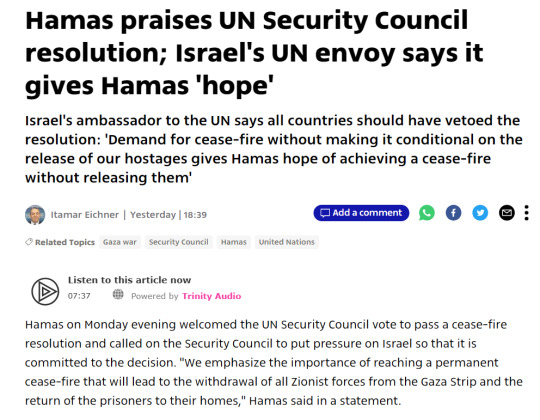
Right after praising the resolution, Hamas also rejected the hostage deal compromise suggested by the US, that Israel had agreed to, which would have seen 40 Israeli hostages freed, in exchange for about 800 convicted Palestinian terrorists let go. Hamas might have said no anyway, but we'll never know for sure what their answer would have been, had this resolution not been passed.
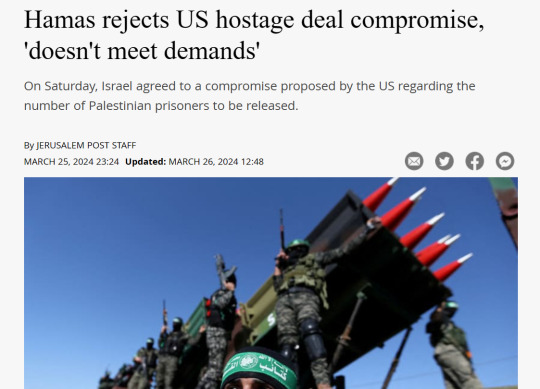
Maybe the most troubling part is that the US insists this UNSC resolution is non-binding, meaning it will have no real effect on Israel's ability to continue fighting during Ramadan. That means, the US abstaining from using its veto wasn't done for the sake of a real chance to help Palestinians. It was a symbolic anti-Israel step, a bone thrown to Israel haters. That's how Israelis understand it, that's how every political player in the international arena (including the overjoyed Hamas) understands it, that's how political analysts understand it, and it should be troubling to everyone, that the US can treat a democratic, self defending, IHL abiding ally this way.

In fact, at least one country is already using this resolution to put pressure on Israel. The President of Colombia has said that unless Israel complies with the resolution and accepts an immediate ceasefire, his country will cut off its diplomatic ties with it.
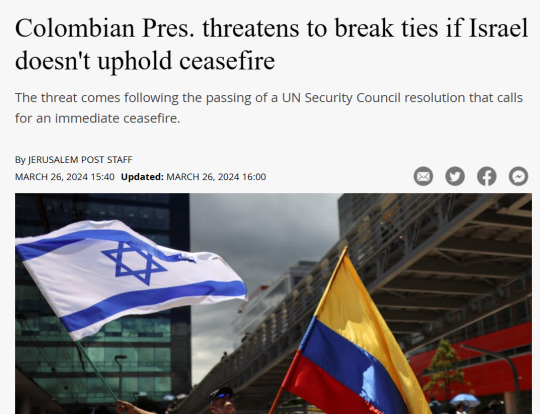
Just one more thing. This is resolution did not include a condemnation of Hamas and the massacre it perpetrated on Oct 7, and yet the US allowed it to pass. The other day, the UNSC immediately condemned the ISIS terrorist attack in Moscow, which left 137 Russians murdered. Nobody suggested that "context" should be brought into it, like that Russia has itself attacked Ukraine (which Putin has implied is behind the attack), or like that ISIS' animosity originates in Russia's protection of the Syrian regime of Bashar Assad, which caused the deaths of hundreds of thousands, including many ISIS terrorists. In sharp contrast to this, almost 6 months into this war, the UNSC has not yet adopted a single resolution condemning the Hamas massacre in which over 1,200 people in Israel were butchered, many raped, and over 250 were kidnapped and are still held captive in Gaza. This discrimination was called out by Israeli ambassador to the UN, Gilad Erdan. He pointed to another example of such discrimination, by reading the resolution that was passed in 2014, when Boko Haram (another Islamist terrorist group) kidnapped Nigerian girls.

This is 65 years old Rami Shani.
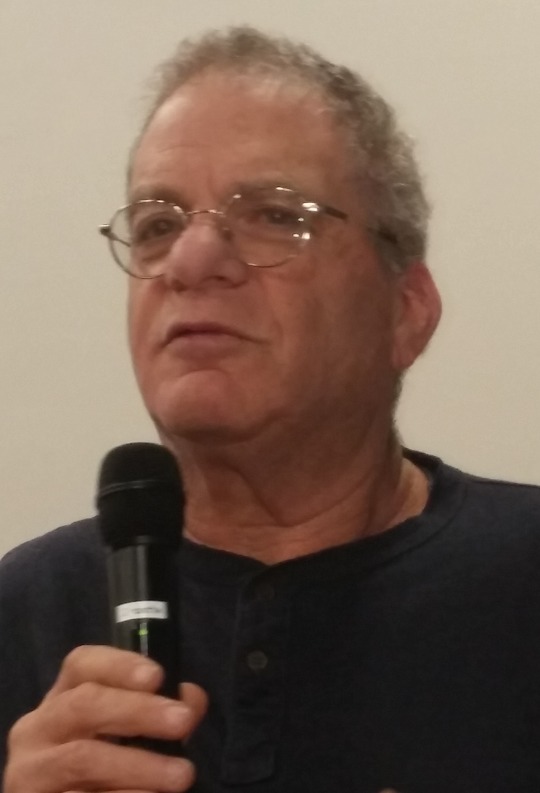
He's a journalist, working for an Israeli radio station. On Oct 7, he happened to be covering a bicycle event taking place in Israel's south, which is why he was already awake and there at 5:30 in the morning. At 6:30, the Hamas attack started. As Rami started getting information about the massacre at the Nova music festival, he abandoned his original task, and started driving in there and getting people out in his car. He said everyone he managed to get out of there was wounded, having been shot in their arms or legs, one woman was shot in the stomach. One of the people he saved was an Israeli Bedouin Muslim Arab, who worked at the party, and was crying as he had been shot in both his arms and legs. In one case, he managed to evacuate 8 young people from the scene while seeing a terrorist squad progressing in his direction. He kept going, until security forces wouldn't allow him to go back in. He saved a total of about 40 people, and has been visiting them in hospitals around the country since then. Whenever you hear anyone arguing that journalists at the scene of a disaster can just keep covering the news, without doing anything to aid the victims, please remember Rami.
(for all of my updates and ask replies regarding Israel, click here)
#israel#antisemitism#israeli#israel news#israel under attack#israel under fire#terrorism#anti terrorism#hamas#antisemitic#antisemites#jews#jew#judaism#jumblr#frumblr#jewish#israelunderattack#un
191 notes
·
View notes
Text
This is a belated post where I wanted to briefly address the outcomes of 2023!
While Ukraine mostly faded from the stage of world's news, unfortunately, the situation didn't get better for my people. Every day Russia kills, maims, and ruins everything it can touch. Every day civilians die from its imprecise missiles, random shootings and artillery, and outright executions. I often see that those living in other countries call this Putin's war, but it really isn't. This is the war sponsored by Putin and his regime, true, but first and foremost, this is the war of Russian people. It's hundreds of thousands of Russian people who arm themselves and go kill our defenders and our civilians. It's Russian people who fire from tanks and other deadly weapons to ruin the Ukrainians' homes, to scorch our land, to leave nothing but destruction instead of cities and villages. It's Russian people who build the missiles, load their bombers, and fly for 5+ hours to direct them at our cities, homes, factories, and even empty fields.
This is me during one of the latest massive attack that took place on January 2. At first, at night, 35+ Russian-Iranian drones bombed us. Then Russian people sent about 100 missiles at us, mainly at my city Kyiv.
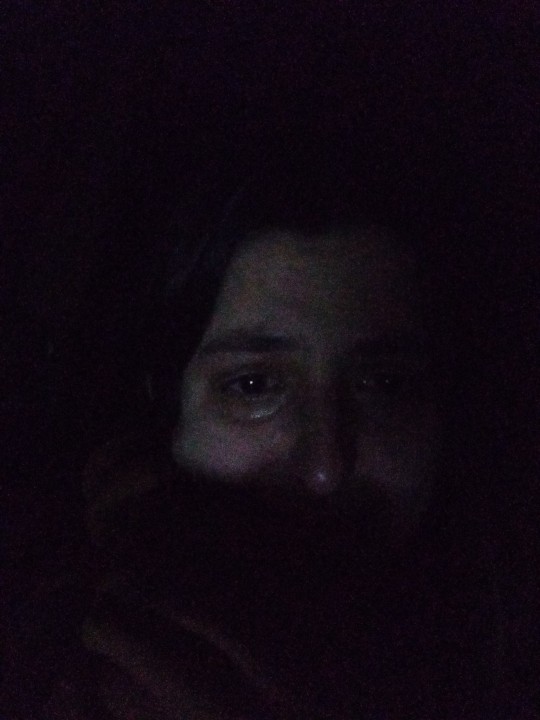
Our air defense system managed to intercept the majority of them, but while it sounds like interception is an entirely positive thing, it might have terrible consequences. Because the parts of the missiles fall down randomly. They can kill any human or creature walking down the street; they can collapse on top of a residential building. There is no escape, no way to feel safe even with the best air defense systems surrounding the city. Here's one of many disastrous results of this attack.

Dead and injured people and animals. Damaged and lost apartments.
On December 29, another attack killed over 30 people in Kyiv alone. You can see their faces below. They deserve to be seen and remembered.
This is a short story of just two latest attacks that took place just within one week, just in one city. Imagine how many of them me and my people lived through during the entire year? How many more we will have to experience?
Actually, we lived through another one before I finished writing this post. It happened on January 8, and it killed even more civilians.
I know that there are good, sane, compassionate Russians. I have some relatives among them. One of them, my aunt, can't keep herself entirely silent: she's deeply religious, and a few weeks ago, in a church, she risked saying that killing Ukrainians is bad. Another man told her that she's scum and that if she dares to open her mouth again, he will report her to authorities. The headmaster of a school where my aunt teaches was imprisoned for 7 years for refusing to hold a Z-event among students. Living there must be a torture of another kind, where you are surrounded by zombies who openly promote terrorism and bless missiles sent to kill other human beings. The problem is that sane and compassionate Russians are the minority - the vast majority is happy to either kill us or they support those who kill us. Or they simply don't care, trying to claim that everything is complicated when in reality, there is nothing complicated about it at all. Russia is a terrorist state and the world allows its people and its government to keep being monsters.
Seeing the indifference and impotence of seemingly powerful countries makes me increasingly concerned and depressed. At this point, I don't think I'm simply affected by my experiences: the world is rapidly going to hell, with terrorist countries like Russia being allowed to revel in their blood-thirstiness and the other terrorist countries, like North Korea, or potential offenders like China, observing and taking notes. When a criminal sees that no one is punished for a crime, they escalate. More criminals appear. This is what I feel is going to start happening more and more, until half of the planet is plunged into death and destruction. I'll be so very glad to be wrong.
On a personal note, I lost my most beloved pet pigeon Daikiria in 2023. I love her and miss her so much that I still cry whenever I think of her. In turn, I acquired a red nightmare of a rabbit who eats everything, including my feet, and two more pigeons. Taking care of them brings me joy - I only hope that my effort will actually benefit them.
Here's a pigeon that I named Noveria the day I found her, in a video I made for my vet. Attacked by a cat, bleeding all over, with broken ribs and a missing piece of her wing, with no tail:
Here is she now. She is feeling much better, although unfortunately, she got sick because of her weakened immune system.
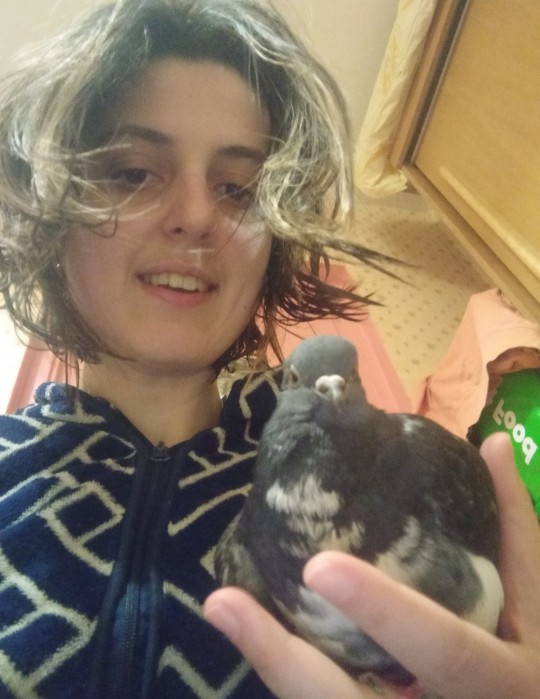
My kitties continue to be adorable dorks. Here's me sleeping with my cat Tom after one of the attacks - he's really scared of loud sounds, so he sleeps like a rock afterward, just like me.
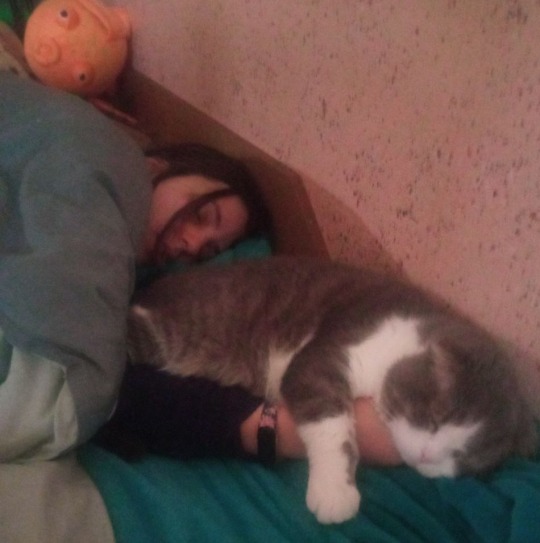
My family stays strong, and I hope we will remain to be so.
Writing stories remains a huge source of relief and distraction to me, and your support, love, and care give me strength even when I feel like I'm about to run out of it.
Thank you to those who support me on Patreon and give me a chance to have a safety net shielding me from some of the horrors and insecurities - thanks to you, I can rest sometimes when I would have to work instead; I can afford some more distractions and to write more as a result. Thank you to those who leave comments, kudos, asks; thank you to my friends who never fail to message me with questions about my well-being. I love and I appreciate you tremendously, and despite all my fears and worries, I hope that we will get to see a better future still.
152 notes
·
View notes
Text
The terrifying perils of appeasing a warlike Russia
THE ECONOMIST
Finland’s cold-war past offers urgent lessons for Ukraine’s future
Nov 16th 2024
IN BARRACKS SQUARE in old Helsinki stands an unusual monument to a war. A towering sculpture of a soldier’s winter snowsuit, its polished steel body is pierced with large round holes, as if still standing after a strafing by cannon fire. It is Finland’s national memorial to the winter war of 1939-40. During that conflict, Finnish troops withstood a huge Soviet force for 105 days, inflicting heavy casualties on the invaders before succumbing to the Red Army’s larger numbers. The Soviet Union imposed harsh terms, taking 10% of its neighbour’s territory. Peace proved fragile, and Finland was soon swept up into the second world war, fighting with Nazi Germany against the Soviet Red Army from 1941-44.
Unveiled in 2017, the memorial’s message is more timely than ever. The winter war has new resonance for Finns. Their country has known 80 years of peace. It boasts one of Europe’s most capable armies, backed by extensive military service for young men and large reserves. Yet even after ditching decades of neutrality to join NATO in April 2023, Finland remains haunted by Russia, its former imperial ruler and neighbour along a 1,340km shared border. “When Russia attacked Ukraine it was as if Finland’s wars were happening yesterday,” says a member of Finland’s tight-knit establishment. Indeed, this old hand worries about younger Finns being “too bold” in denouncing Russia. Membership of the European Union and NATO is all very well. But Finland is a small country whose fate has often been decided by great powers, and Russia will always be there. “We know that the big guys can always agree things above our head. We can always be alone.”
This is a moment for all Europe to ponder that memorial in a Helsinki square. For that battered, but still-recognisable uniform—hollow and headless, with the sky visible through its many holes—presents an important question. What can a country afford to lose, and what must it preserve, and still be true to itself? …
48 notes
·
View notes
Text
An air raid alert has just started when Victoria Itskovych joins a Zoom call from Kyiv. “It’s, like, a usual situation,” she says. “But really, it’s not usual.” February 24 will mark the second anniversary of Russia’s full-scale invasion of Ukraine. For nearly two years now, Kyiv has been under bombardment. Some weeks, people have to trudge to their shelters night after night, checking text alerts and Telegram channels to figure out where the missiles are falling and when it’s safe to come out—although, it’s never really safe.
That relentless stress, and the trauma of losing family, friends, and colleagues on the front, has taken its toll. A poll by the city government last year found that 80 percent of residents reported symptoms of post-traumatic stress disorder. Russia’s full-scale invasion of Ukraine has exposed the whole of Ukrainian society to battle shock. “We’ve all suffered from this,” says Itskovych, who is director of the Kyiv City Council’s IT department. “Almost every person has somebody who was injured or died during the war, or lost their home or lost their health.”
In the face of such widespread injury, the Kyiv government has turned to Ukraine’s now-famous civic tech infrastructure for help. As the war enters its third year, the municipal government is starting to build a citywide system for providing mental health support to citizens. It’s a vast challenge, but also a unique opportunity—the first time that such a mass-trauma event has happened to a society that has already built the tools of digital government. Dealing with the mental health impacts of the invasion will be absolutely vital to keep society resilient, functioning, and committed enough to repel the invaders. It’s also the key to Ukraine’s postwar recovery, laying the groundwork now for a society that can rebuild itself physically and psychologically from the horrors of war. “This is the future of our society,” Itskovych says. “We are building the basis for the resilience of the community itself.”
At the heart of the plan is the Kyiv government’s digital platform, Kyiv Digital, which it launched in 2017. Before the invasion, it was largely used to manage parking and public transport, and to notify residents of disruptions to services such as road closures or power outages. When the war began, those notifications became more urgent: incoming attacks, the locations of bomb shelters, and the safest routes to reach them. Like other parts of Ukraine’s civilian technology, the city pivoted its tools to keep people safe and support the war effort, bootstrapping and rewiring the systems at pace.
“The first changes to the notifications we did in hours,” says Oleg Polovynko, adviser on digitalization to Kyiv’s mayor. Since then, the digital teams have been engaged in a constant cycle of innovation, trying to figure out what services they can bring online. The war has pushed them to act more quickly, to adapt tools they have and invent things that don’t exist.
They’ve expanded tools for civic participation, letting citizens vote on petitions, send feedback to the city government, and ask for help, such as financial support to repair bomb-damaged homes. And they’ve collected a lot of data, which is how the Kyiv government has been able to measure the scale of the city’s distress—and people’s reluctance to seek help. Of the 80 percent of residents who show signs of trauma, “40 to 45 percent are afraid to have contact with doctors who can help,” Polovynko says.
But this is only half of the problem that needs solving. For those who do want to seek treatment, there simply aren’t enough resources to help them. Clinical psychologists are supposed to limit the number of patient consultations they do in a day, so they don’t burn out. Before the full-scale invasion, Inna Davydenko saw a maximum of four patients daily. Today, Davydenko, a mental health specialist at the City Center of Neurorehabilitation in Kyiv, sees twice that number. When we speak, she’s just finished a video call with a soldier stationed near the front, whom she’s helping cope with stress and anxiety.
Even before the war massively increased the number of people dealing with trauma, depression, and anxiety, Ukraine’s medical system suffered from an underinvestment in mental health provision. “In most hospitals, you have maybe one psychologist. In good hospitals, it’s maybe two,” Davydenko says. “A lot of people need psychological help, but we can’t cover everything.” There is simply no way that the current system can grow to match the enormous jump in demand. But, Davydenko says, “almost every Ukrainian person has a smartphone.”
This is exactly what Polovynko and Itskovych want to exploit, using Kyiv Digital’s platforms and data to digitize mental health support for the city, and so close the gap between need and resources. Their project will focus first on those they’ve identified as being most vulnerable—war veterans and children—and those most able to help others: teachers and parents. The next six months of the project will be a “discovery stage,” Polovynko says. “We need to understand the real life of our veterans now, of the children, of the parents, what’s their context, how they survive, what services they use.”
The project will track people through the process of recovering from trauma, monitoring the treatments they ask for and the ones they receive, their concerns as they move through the mental health system, and their outcomes. Once the team has a detailed map of services and bottlenecks, and data on what’s working and what’s not, they can match individual needs with treatments. A full roll-out is scheduled for early 2025.
“It doesn't mean that the whole chain of the service will be absolutely digital,” Itskovych says. Some patients may be directed to group therapy or one-on-one meetings with psychologists, others will be given access to online tools. The aim, she says, is to create efficiency, to close the service gap, but also to provide comfort, meeting people where they are. “For a big part of our clients, there is more comfort with getting the service online, in different ways. Some people are not comfortable meeting a specialist one-on-one; they prefer a digital way to get the service.”
The project is being supported financially and operationally by Bloomberg Philanthropies, a charitable organization created by former New York mayor and Bloomberg founder Michael Bloomberg. James Anderson, head of government innovation at the organization, says that the project comes at a critical time for Kyiv, where people continue to suffer even though global attention has shifted away to other crises.
“There's always a tremendous amount of attention when the immediate crisis hits,” Anderson says. “But mayors continue to have to deal with the human costs of crises, long after the newspapers have turned to new subjects. That’s certainly what we sense and see in Kyiv.”
The size of the challenge in Kyiv is clearly daunting. But, Anderson says, there are reasons for optimism. Cities have got better over the past two decades at responding to common crises, such as Covid-19, which also required rapid, mass digitization of services. “Every crisis is distinct and different, and awful, in its own way,” Anderson says, “but there are lessons learned.” The Kyiv government, and Ukrainian society more widely, have demonstrated a capacity for rapid innovation to meet urgent needs, and Anderson hopes that success in this project could see it replicated internationally. “This is not the last war. This is not the last crisis,” he says. “I think Kyiv has lessons that they can share with cities around the globe.”
For Kyiv, and Ukraine, the crisis won’t end when the war does. “Psychological health is the number one problem for Ukraine,” Davydenko says, before correcting herself. “Number one is Russia, number two is our psychological health,” she says. “PTSD is our future.”
124 notes
·
View notes
Text
It's after midnight and I've been watching the election returns since I got home. To say that this night has not gone the way I wanted (or hoped) is a tremendous understatement. It feels like a significant portion of my country has developed amnesia about just what happened during a first Trump administration and decided that all the chaos and the trampling of our democracy was less important than a few cents on a gallon of gas.
I am not at all blind to what Trump will do with another four years in the White House. The Supreme Court will be lost for at least a generation. A nation-wide abortion ban is more than a probable prospect. Marriage equality and trans rights will be dragged back decades. Ukraine will be left to fend for itself against Russia and the NATO alliance is more than likely to be diminished. This bodes very badly for our allies like Taipei, who are facing off against an increasingly hostile China. We can forget about making any kind of meaningful progress on climate change. Israel will have the blessing of the US to continue it's attacks on Gaza and Lebanon.
I'm past the point of being upset. I'm positively numb. I can't help from looking at what is happening like its a slow moving car crash that I'm helpless to stop. This is going to reverberate far beyond my country and I can't begin to wrap my mind over just how devastating this will be for the world.
The political scientist in me will take time later to figure out why this went so wrong. How a man who was found in a court of law of sexually assaulting a woman, who has been convicted of felonies and faces multiple other criminal charges will soon be the President again. How the very people who will suffer the most under a Trump presidency were the ones who helped put him back into office. I want to hold on to hope and keep fighting, but right now I just don't have it in me anymore.
40 notes
·
View notes
Text
This happened only a few hours ago and the US has already stated that Ukraine had nothing to do with it, which is a little suspicious.
How would the US know the motivations of the gunmen before the media even knows how many gunmen there were? Or do they just automatically jump to the defence of their allies before information comes in?
76 notes
·
View notes
Text
Imagine that someone—perhaps a man from Florida, or maybe even a governor of Florida—criticized American support for Ukraine. Imagine that this person dismissed the war between Russia and Ukraine as a purely local matter, of no broader significance. Imagine that this person even told a far-right television personality that “while the U.S. has many vital national interests ... becoming further entangled in a territorial dispute between Ukraine and Russia is not one of them.” How would a Ukrainian respond? More to the point, how would the leader of Ukraine respond?
As it happens, an opportunity to ask that hypothetical question recently availed itself. The chair of the board of directors of The Atlantic, Laurene Powell Jobs; The Atlantic’s editor in chief, Jeffrey Goldberg; and I interviewed President Volodymyr Zelensky several days ago in the presidential palace in Kyiv. In the course of an hour-long conversation, Goldberg asked Zelensky what he would say to someone, perhaps a governor of Florida, who wonders why Americans should help Ukraine.
Zelensky, answering in English, told us that he would respond pragmatically. He didn’t want to appeal to the hearts of Americans, in other words, but to their heads. Were Americans to cut off Ukraine from ammunition and weapons, after all, there would be clear consequences in the real world, first for Ukraine’s neighbors but then for others:
If we will not have enough weapons, that means we will be weak. If we will be weak, they will occupy us. If they occupy us, they will be on the borders of Moldova and they will occupy Moldova. When they have occupied Moldova, they will [travel through] Belarus and they will occupy Latvia, Lithuania, and Estonia. That’s three Baltic countries which are members of NATO. They will occupy them. Of course, [the Balts] are brave people, and they will fight. But they are small. And they don’t have nuclear weapons. So they will be attacked by Russians because that is the policy of Russia, to take back all the countries which have been previously part of the Soviet Union.
And after that, if there were still no further response? Then, he explained, the struggle would continue:
When they will occupy NATO countries, and also be on the borders of Poland and maybe fight with Poland, the question is: Will you send all your soldiers with weapons, all your pilots, all your ships? Will you send tanks and armored vehicles with your young people? Will you do it? Because if you will not do it, you will have no NATO.
At that point, he said, Americans will face a different choice: not politicians deciding whether “to give weapons or not to give weapons” to Ukrainians, but instead, “fathers and mothers” deciding whether to send their children to fight to keep a large part of the planet, filled with America’s allies and most important trading partners, from Russian occupation.
But there would be other consequences too. One of the most horrifying weapons that Russia has used against Ukraine is the Iranian-manufactured Shahed drone, which has no purpose other than to kill civilians. After these drones are used to subdue Ukraine, Zelensky asked, how long would it be before they are used against Israel? If Russia can attack a smaller neighbor with impunity, regimes such as Iran’s are sure to take note. So then the question arises again: “When they will try to occupy Israel, will the United States help Israel? That is the question. Very pragmatic.”
Finally, Zelensky posed a third question. During the war, Ukraine has been attacked by rockets, cruise missiles, ballistic missiles—“not hundreds, but thousands”:
So what will you do when Russia will use rockets to attack your allies, to [attack] civilian people? And what will you do when Russia, after that, if they do not see [opposition] from big countries like the United States? What will you do if they will use rockets on your territory?
And this was his answer: Help us fight them here, help us defeat them here, and you won’t have to fight them anywhere else. Help us preserve some kind of open, normal society, using our soldiers and not your soldiers. That will help you preserve your open, normal society, and that of others too. Help Ukraine fight Russia now so that no one else has to fight Russia later, and so that harder and more painful choices don’t have to be made down the line.
“It’s about nature. It’s about life,” he said. “That’s it.”
#current events#warfare#politics#russian politics#american politics#russo-ukrainian war#2022 russian invasion of ukraine#russia#ukraine#usa#volodymyr zelenskyy#ron desantis#nato
245 notes
·
View notes
Text

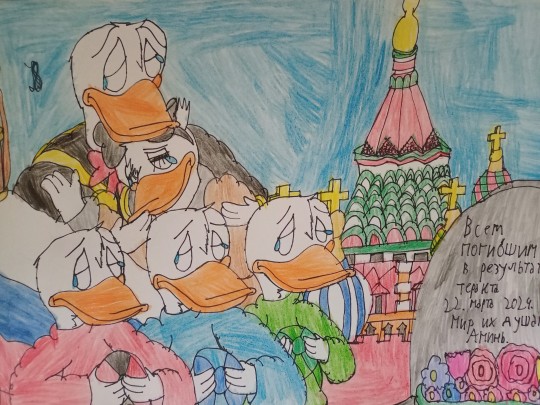
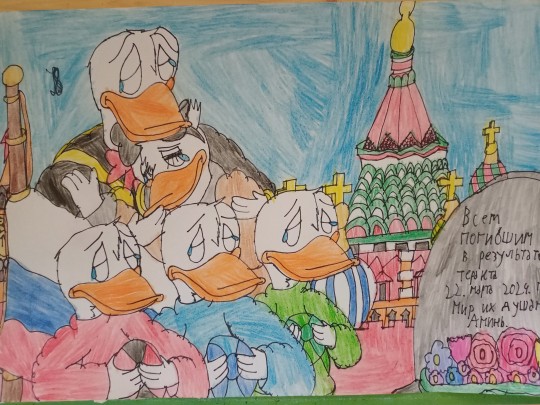
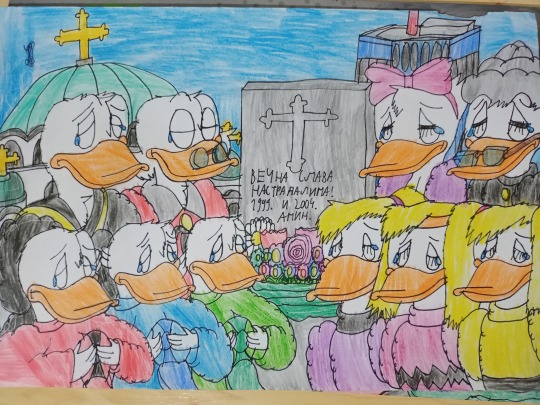
Donald Duck and his family mourn the dead in memory of the victims of the terrorist attack and bombing - Donald Duck and his family in Moscow (Russia) and Belgrade (Serbia) - Duck comics - Duckverse
Unfortunately, sorry for the long wait, because I was sick for a few weeks, and I'm recovering a bit now, so I haven't had a chance to draw and post new drawings. Yes, I'm back and will post follow-up drawings related to the previous holidays that were marked as well as the following holidays in the coming period.
Unfortunately, due to the recent events, I am publishing my sad drawings where Donald Duck and his family mourn the deceased. The first drawing shows Donald Duck with Daisy Duck, along with his nephews Huey, Dewey and Louie Duck who went to Moscow (the capital of Russia) and where they are mourning the dead and honoring the departed since a week ago (22.3. 2024) a terrorist attack took place in Moscow, in the Crocus City Hall, where over 140 people were killed and over 360 wounded. More could have been killed, if not for a few young men (Muslims and Russians) who saved the other people and took them out of the concert hall, because a concert by a Russian music group was about to take place. Among the dead were not only Russians, but also members of other nationalities who wanted to see that concert. The perpetrators are alleged Muslim terrorists from the Islamic State, and all of them were later caught. I don't want to go further into the discussion about the main principal who financed these terrorists, nor do I want to go into the discussion about the current war in Ukraine, because my blog is not about politics and please don't ask me those questions. This just shows my respect for the deceased not only the victims of that terrorist attack but also all the victims who died in terrorist attacks in the last more than 24 years. It is certainly a terrible event, which is why two days of mourning were declared after that, and I drew the Russian flag at half-mast, because on the day of mourning, the flag is only flown at half-mast, and Daisy in that drawing is wearing a coat and a black bow as a sign of mourning and black clothes are usually worn at funerals. Behind them, you can see the Basilica of St. Basil as well as the Spasskaya Tower, which is located within the Kremlin. Rest in peace to those victims.
Покойтесь с миром жертвы теракта! Слава им! Аминь.
The second drawing shows Donald with his family who are in Belgrade (the capital of Serbia) where they are mourning those who died and died during the bombing by NATO in 1999, as well as the victims in Kosovo and Metohija in 2004. I said that I come from Serbia and what happened 25 years ago was something that many residents of my country cannot forget. I was two years old when it started, so I don't remember it, except from the story of my parents. I don't want to go further into the discussion about the beginning of the war because the topic is too painful, and I doubt that many would understand what I would say. All in all, civilians did not deserve such a thing and it is very difficult to get over such wounds. Because among the dead there were also children who suffered from NATO bombing. There was also the courage of the soldiers who defended the country from the attackers and died bravely defending their country, so they are also honored. In addition to Donald, there are also Daisy Duck, Grandma Duck (Elvira Coot), Scrooge McDuck, Huey, Dewey and Louie Duck (Donald's nephews), April, May and June Duck (Daisy's nieces) where they pay tribute to those who died in that war as well as in the violence in Kosovo and Metohija that occurred in 2004, when there was also a mass exodus of Serbs, Roma, Bosniaks and other non-Albanian people from Kosovo and Metohija and the demolition of numerous Orthodox monasteries and churches by Albanian fanatics. Behind them is the Church of St. Sava, one of the largest Orthodox churches in the world, as well as the Beogradanka building, where one of Belgrade's television stations is located. On that grave is written the dedication to those victims as well as the flowers brought to that grave.
Rest in peace to those victims! Amen.
Вечна слава настрадалима и нека почивају у миру! Амин.
Also, since tomorrow is Good Friday, the day of the martyrdom of Jesus Christ, which is a sad day for Christians.
These are my tribute to those victims as well as those who suffered, and that the victims should not be forgotten and history should not be forgotten, because if it is forgotten, it will repeat itself again. Feel free to share this, but please do not use this for other people's purposes and please do not complicate it with political issues, because this blog is not dedicated to that. May God welcome the victims into the Kingdom of God and may they receive eternal glory! Rest in peace! Amen.
#my fanarts#tribute to victims#donald duck#duckverse#ducktales#russia#serbia#moscow#belgrade#yugoslavia#yugoslavia wars#Crocus City Hall attack#daisy duck#scrooge mcduck#grandma duck#elvira coot#huey dewey and louie#april may and june#artists on tumblr#huey dewey and louie duck#april may and june duck#disney ducks#disney duckverse#duck family#fanarts#rest in peace#amen#disney duck comics#duck comics#disney comics
46 notes
·
View notes
Text
So yesterday in Russia a bunch of terrorists opened fire in a concert hall just outside Moscow, killed a bunch of people and set fire to the building.
Couple of interesting things about this morbid affair:
Let's first center the victims. They were just innocent people who went to listen to a popular (if bad) rock band. None of them deserved this and my deepest condolences go to their loved ones.
Confirmed deaths are low right now, but because Russian rescue forces are the way they are, the rescue effort was terrible and the number of dead people is sure to rise.
This is already the single deadliest terrorist attack in Russia since the mid-00s, during the second Chechen War.
ISIS took responsibility on their official Telegram channel, but they will take responsibility for anything.
Authorities are searching specifically for people of Central Asian or North Caucasus descent and have apparently made several arrests already. But it's all a bit suspicious.
The terrorists were described as acting in a really professional manner, taking the security down first, shooting single shots or in small bursts as opposed to spray and pray. But then they just made a dash to a border with Belarus, on the same car they were seen leaving the venue in? Seems suspicious.
The US intelligence warned the embassy staff last week that a terrorist attack was being planned in Moscow. So they knew in advance something was going to happen.
Putin offered very little in terms of a response or a reaction, so the whole thing was likely a surprise to him. Even though Americans apparently also warned the Kremlin.
Just a lot of things don't add up at this point. Although things are developing and we will learn more details later.
Russia being Russia means we are already privy to a very limited amount of info.
The state is most likely to blame this on Ukraine. They will not let a good tragedy go to waste.
Overall, I have a sinking feeling this is going to turn out bad for everyone.
30 notes
·
View notes
Text
I don't usually share about my personal life or myself, and I truly don't want to be a bummer, and sorry about it, but, truth to be told, I feel like I have to let it all out. Maybe, I feel extra lonely or extra exhausted, maybe, all together, or maybe, there's no real reason other then I'm just a human who's just enormously tired.
I live in Ukraine and I'm Ukrainian, and all these 2,5 years since Russia's full-scale invasion I don't remember a single day of happiness or comfort. Every day we have harsh attacks, every day the news it's a necrology and the pictures of ruins everywhere, of places I know, of places where I currently live.
I don't remember when the last time I slept well, it's been months of constant sleep deprivation because we have attacks. And, in waves, it's like this for 2,5 years. Some months - it's worse, some - with some short pauses, but it's always like this for 2,5 years.
And all while, I also have very ordinary problems like any other human, and a very stressful job, I work at night. I spent hours and hours on the floor during the attacks because it's the only "safe" place in my apartment where I live - I don't have the rule of "two walls", and on the floor, at least, if the window will be blown away, maybe, 2% will give me a chance not to have glass/small missile fragments in my body. In addition, we have the scheduled blackouts again - like we used to have it during autumn 2022/ winter 2023, now, due to other harsh attacks we have another deficit of power.
Not to mention, every time I see my arts and writing flopping, I feel even worse and even more demotivated; every time I see it, I think that "yeah, nice, it happened again, but who knows if I'll be alive tomorrow to see if it changes¯\_(ツ)_/¯".
I understand that I'm not that great in anything and nobody owes me anything, I truly understand it. And it's totally fair.
It's just sad for me on top of everything, on top of every other horror I'm going through every day.
Every day is just another survival game, and I'm holding on somehow, I have no privilege nor possibility to give up and/or to take a break.
I feel like I'm shattering, piece by piece, slowly. I'm still here, holding on, finding every drop of strength that left in me to keep going, but every day it's becoming more and more difficult. But I hold on like whole Ukraine holds on.
I'm writing it while listening to the booming scream of the sirens, our daily soundtrack, because right now we have another huge attack, with several types of missiles from dozens bomber jets.
It's my routine I didn't choose but the one I'm forced to live. The one I adopted to live in, the one that seems to me as a norm, as something quotidian. I don't remember life before. It seems, like it never happened.
I just want to let it all out, I don't ask for pity or anything else.
I'm fine, as much as I can be in such conditions.
So thank you if you've reached this. Hope you're doing fine, everyone, and I wish you all the best.
41 notes
·
View notes